Balkrishna Doshi
| Line 74: | Line 74: | ||
[https://www.architecturaldigest.in/content/photos-9-iconic-buildings-designed-by-architect-bv-doshi/ Devanshi Shah, 9 iconic buildings designed by BV Doshi, August 26, 2017: ''Architectural Digest''] | [https://www.architecturaldigest.in/content/photos-9-iconic-buildings-designed-by-architect-bv-doshi/ Devanshi Shah, 9 iconic buildings designed by BV Doshi, August 26, 2017: ''Architectural Digest''] | ||
| − | [[File: Centre for Environmental Planning and Technology.jpg|Centre for Environmental Planning and Technology <br/> From: [https://www.architecturaldigest.in/content/photos-9-iconic-buildings-designed-by-architect-bv-doshi/ Devanshi Shah, 9 iconic buildings designed by BV Doshi, August 26, 2017: ''Architectural Digest'']|frame|500px]] | + | [[File: Centre for Environmental Planning and Technology, Ahmedabad.jpg|Centre for Environmental Planning and Technology, Ahmedabad <br/> From: [https://www.architecturaldigest.in/content/photos-9-iconic-buildings-designed-by-architect-bv-doshi/ Devanshi Shah, 9 iconic buildings designed by BV Doshi, August 26, 2017: ''Architectural Digest'']|frame|500px]] |
[[File: Aranya Low Cost Housing, Indore.jpg|Aranya Low Cost Housing, Indore <br/> From: [https://www.architecturaldigest.in/content/photos-9-iconic-buildings-designed-by-architect-bv-doshi/ Devanshi Shah, 9 iconic buildings designed by BV Doshi, August 26, 2017: ''Architectural Digest'']|frame|500px]] | [[File: Aranya Low Cost Housing, Indore.jpg|Aranya Low Cost Housing, Indore <br/> From: [https://www.architecturaldigest.in/content/photos-9-iconic-buildings-designed-by-architect-bv-doshi/ Devanshi Shah, 9 iconic buildings designed by BV Doshi, August 26, 2017: ''Architectural Digest'']|frame|500px]] | ||
Revision as of 01:44, 10 March 2018
This is a collection of articles archived for the excellence of their content. |
2018: First Indian to receive the Pritzker Prize
Balkrishna Vithaldas Doshi, the legendary Indian architect who designs not just buildings but institutions, is being honored with the Pritzker Architecture Prize, the Nobel equivalent for the field, it was announced on Wednesday.
‘Architecture Nobel’
Architect Balkrishna Doshi, a pioneer of low-cost housing design, won the prestigious Pritzker Prize, considered architecture’s Nobel equivalent.
The 90-year-old Mr. Doshi — one of the last living architects to have apprenticed with the Franco-Swiss trailblazer Le Corbusier — distinguished his work by committing to sustainable architecture and inexpensive housing, bringing modernist design to a country rooted in traditionalism.
He is the 45th Pritzker laureate and the first from India. “Balkrishna Doshi has always created an architecture that is serious, never flashy or a follower of trends,” said the Pritzker jury, which said Mr. Doshi “has continually exhibited the objectives” of architecture’s highest honour.
“Over the years, Balkrishna Doshi has always created an architecture that is serious, never flashy or a follower of trends. With a deep sense of responsibility and a desire to contribute to his country and its people through high quality, authentic architecture, he has created projects for public administrations and utilities, educational and cultural institutions, and residences for private clients, among others,” the Pritzker jury said in its announcement.
An alumnus of the JJ School of Architecture in Mumbai, Doshi worked with the legendary Le Corbusier in Paris in the 1950s before retur ning to India to supervise the architect's projects.
“Balkrishna Doshi constantly demonstrates that all good architecture and urban planning must not only unite purpose and structure but must take into account climate, site, technique, and craft, along with a deep understanding and appreciation of the context in the broadest sense,” the jury said. “Projects must go beyond the functional to connect with the human spirit through poetic and philosophical underpinnings.”
The international Pritzker prize, established by Chicago’s Pritzker family in 1979, bestows laureates with $100,000 along with a bronze medallion.
Over the course of his career spanning six decades Mr. Doshi developed an architectural style that considered human needs as well as sociocultural context, all while infusing his designs with modernist elements that reflected what he called “contemporary expression for a sustainable holistic habitat.”
His accomplishments include everything from working on the Indian Institute of Management to designing the Aranya low cost housing project in the city of Indore, completed in 1989.
Housing for the poor
The intricate labyrinth of houses, courtyards and internal trails today houses some 80,000 people, with more than 6,500 units ranging from modest one-bedrooms to spacious homes.
“It seems I should take an oath and remember it for my lifetime: to provide the lowest class with the proper dwelling,” the architect said in 1954.
“My works are an extension of my life, philosophy and dreams trying to create treasury of the architectural spirit,” Mr. Doshi said in a statement thanking the Pritzker jury, in which he also cited the influence of Le Corbusier.
Exhibiting an aptitude for art and an acute sense of proportion at a young age, Mr. Doshi began studying architecture in 1947, the year India gained independence.
Working under Le Corbusier, he returned to his native country in 1954 to oversee two of his modernist guru’s projects in Chandigarh and Ahmedabad. The Indian architect also collaborated with Louis Kahn, another of the 20th century’s modernist giants.
Mr. Doshi’s many accolades include the Officer of the Order of Arts and Letters of France, which he received in 2011, as well as the 2007 Global Award for Lifetime Achievement for Sustainable Architecture from Paris’s Institut Francais d’Architecture. In 2000, he won the Prime Minister’s National Award for Excellence in Urban Planning and Design.
Calling the award “deeply touching and rewarding,” Mr. Doshi said the recognition reaffirms his belief that “life celebrates when lifestyle and architecture fuse.”
“Every object around us, and nature itself — lights, sky, water and storm — everything is in a symphony,” said Mr. Doshi. “This symphony is what architecture is all about.”
Doshi is also known as an institution builder
BV Doshi established his studio Vastu-Shilpa (environmental design) in 1955 and worked with Louis Kahn and Anant Raje in designing the campus of Indian Institute of Management, Ahmedabad. He would go on to design IIMs in Bangalore and Lucknow, the National Institute of Fashion Technology, Tagore Memorial Hall, the Institute of Indology in Ahmedabad, among other fine campuses and buildings across India, besides many low-cost housing projects.
He is also known as an institution builder: the founder-director of the School of Architecture (Ahmedabad); founder-director of the School of Planning, founder Dean of the Centre for Environmental Planning and Technology (whose building he also designed), founder member of the Visual Arts Centre, Ahmedabad and founderdirector of the Kanoria Centre for Arts, Ahmedabad.
“My works are an extension of my life, philosophy and dreams trying to create treasury of the architectural spirit. I owe this prestigious prize to my guru, Le Corbusier. His teachings led me to question identity and compelled me to discover new regionally adopted contemporary expression for a sustainable holistic habitat,” Doshi said in response to the honor. Doshi came from a family of furniture makers, and in one interview he credited his early architecture inspiration to his grandfather's house, upon which new levels were repeatedly added to accommodate a large joint family of three uncles and their families.
Doshi: a life in architecture
March 9, 2018: The Times of India

From: March 9, 2018: The Times of India
Celebrated as a pioneer of low-cost housing in India, Balkrishna Vithaldas Doshi said his works are an extension of his “life, philosophy and dreams” after being named for the Pritzker prize, or architecture Nobel, for 2018, the first Indian to win the award.
Buildings
Devanshi Shah, 9 iconic buildings designed by BV Doshi, August 26, 2017: Architectural Digest
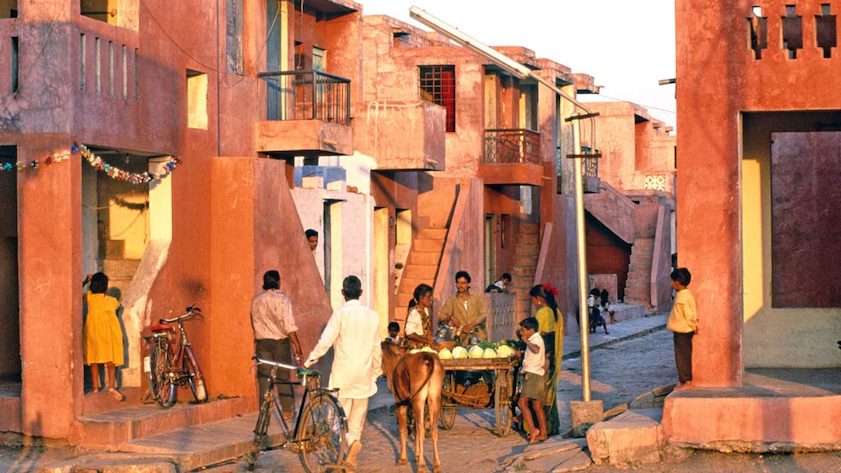
From: Devanshi Shah, 9 iconic buildings designed by BV Doshi, August 26, 2017: Architectural Digest
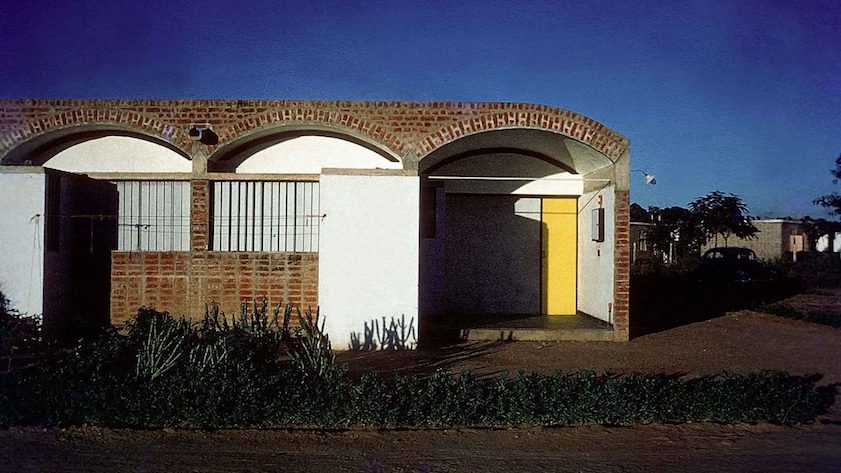
From: Devanshi Shah, 9 iconic buildings designed by BV Doshi, August 26, 2017: Architectural Digest
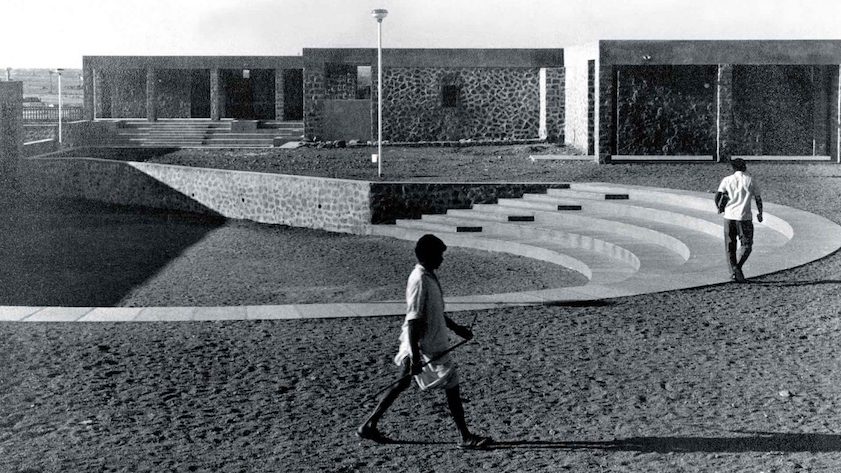
From: Devanshi Shah, 9 iconic buildings designed by BV Doshi, August 26, 2017: Architectural Digest
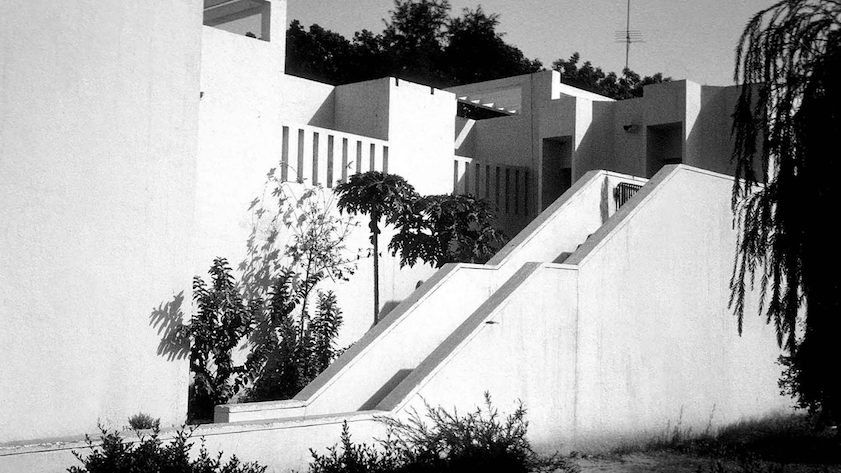
From: Devanshi Shah, 9 iconic buildings designed by BV Doshi, August 26, 2017: Architectural Digest
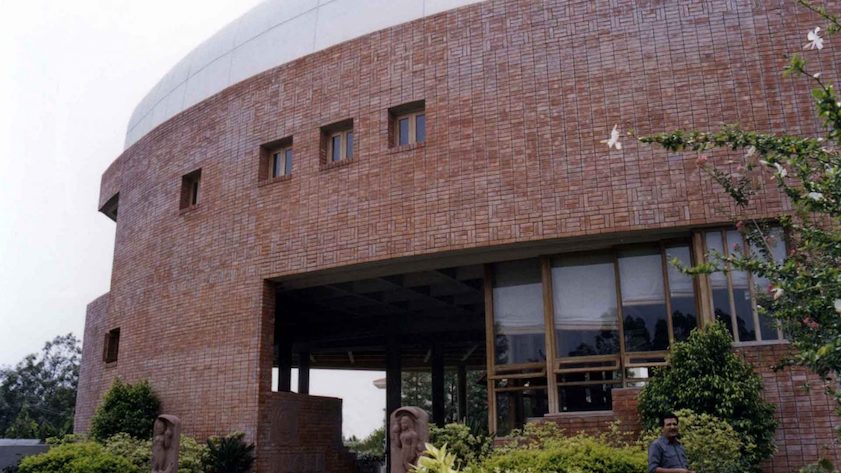
From: Devanshi Shah, 9 iconic buildings designed by BV Doshi, August 26, 2017: Architectural Digest